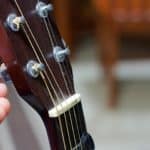Guitars are rather miscellaneous instruments.
That is to say, they are tools full of diversity. They create lots of different sounds and adapt to tens of genres and subgenres.
From Rock to Pop, from metal to reggae, from classical to folk. They fit anywhere!
What’s more, guitars also can be set to get a wide variety of tunings.
Therefore, certain bands (especially metal bands), can find alternative tunings to experiment with other tones.
All in all, guitars make music a richer art.
However, it is possible to encounter certain doubts when talking about this idea.
More specifically, many guitarists fear that their beloved instruments could get damaged because of different tuning settings.
Is that possible?
Guitars cannot get damaged because of alternative tunings. In any case, the string could break due to tuning them to a higher pitch. Other than that, any guitar or bass guitar is safe from alternative tunings.
This topic is too rich to focus on that quick answer.
Therefore, we invite you to check this article out. It will answer every doubt you have.
Plus, it will make you see that you can safely play guitar in any tuning you want to.
Here we go!
Can different tunings damage your guitar?
It might be easier to have a dozen guitars, each one for its unique tuning. One for Drop D, another for Drop C#, and of course, an acoustic in standard tuning for those summer camps.
Unfortunately, the reality is a bit harsh, and most of us only dream of doing such a thing.
Therefore, dreamers must get used to simply switching tuning whenever they want a change.
The good news is it is impossible to damage a guitar by alternating tunings.
If anything, you are risking breaking a string but only when tuning in a higher tone (let’s say, F Standard).
Other than that, your guitar will be fine. The only problem will be the mere fact that you need to switch tunings every time you want to sound different.
It is not dangerous, but it might be a bit tiring.
Can changing guitar tunings often damage your instrument?
Once again, an alternate tuning will not damage or destroy your instrument.
The only two issues you may find are the following.
First, strings could break. As we mentioned before, if the tuning is too high, the string may break.
However, this scenario is most likely not to happen, since most tunings go from high to down.
In any case, tuning down regularly could lead to string slack, which could make your guitar go out of tune easily. Therefore, try to tune down to up until you get the tuning you were looking for.
Second, consider that on rare occasions, a guitar may require a setup.
You will notice it when the guitar produces buzzing, vibration, or tuning problems.
This, however, won’t be beyond recall.
If you need to understand this topic more thoroughly, then we recommend checking this article. You’ll find all the answers you need.
Guitars are tougher than you think
Guitars are powerful instruments.
And no, not just because they create wonderful sounds. They are vigorous because they are resistant.
See, guitars are made to take string tension. They won’t bend as if they are made of rubber.
And we cannot stress this enough, but the biggest risk is on the strings!
They will either go out of tune or break. The other parts of the guitar will be fine.
Where does the idea that tunings can damage your instrument from?
All in all, thinking that a guitar will get damaged just because of alternate tunings is nothing but another musical myth.
It seems that this fear of breaking an instrument comes from the false belief that it will produce neck bending.
Nonetheless, neck bending occurs because of different reasons, such as heat and humidity.
What are things that really can damage a guitar?
A warning. What you are about to read might scare you away.
Unfortunately, it is nothing but reality: there are lots of threats to your guitar.
I’m sorry to tell you, but it is a fact.
Of course, alternative tunings are not one of those.
What damages a guitar is mainly weather conditions, including heat, humidity, sunlight, and cold.
Common issues include neck bending, melted glue (which splits up the parts of a guitar), expanded wood, finish discolorment, etc.
Warp is another common problem regarding guitars. Both humidity and dryness may crack the guitar’s wood.
These issues generally occur because guitarists don’t know how to take care of their guitars.
For example, some guitarists may leave their guitars lying unprotected somewhere in a room, instead of putting them inside a guitar case. Also, unzipped cases or bags lead to the same problems.
After all, if a guitar is not properly taken care of, they run the risk of getting damaged by climate.
Not to mention, they are prone to receive blows or scratches without protection.
Take care of your guitar. It is too much of a valuable object.

Hello there, my name is Ramiro and I’ve been playing guitar for almost 20 years. I’m obsessed with everything gear-related and I thought it might be worth sharing it. From guitars, pedals, amps, and synths to studio gear and production tips, I hope you find what I post here useful, and I’ll try my best to keep it entertaining also.





